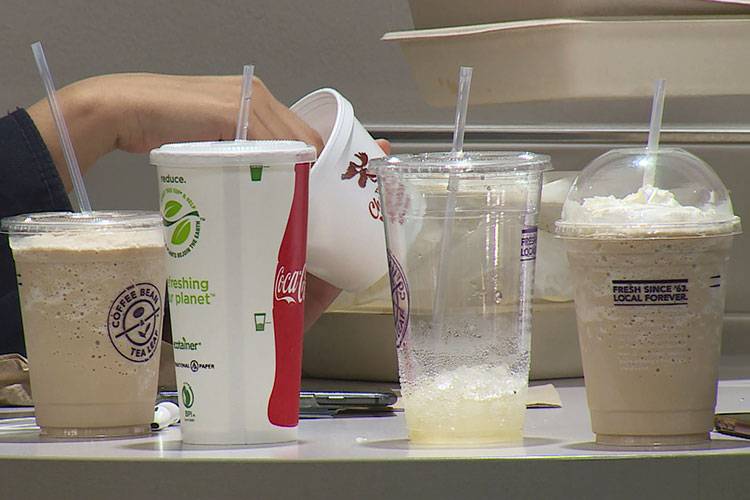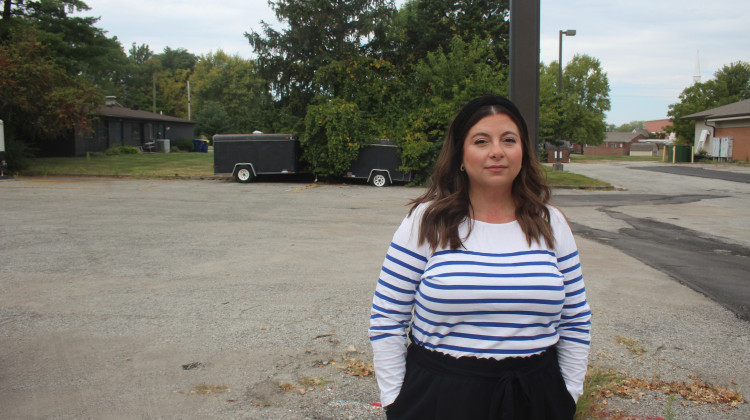
Plastic straws typically aren’t recyclable, ending up in landfills, waterways and even marine life. (Steve Burns/WTIU-WFIU News)
One after another, restaurants, businesses and even communities are dropping plastic straws. The immediate goal is to reduce the hundreds of millions of plastic straws estimated to be used in the country each day.
But some people are thinking much bigger, and they’re hopeful the straw movement will lead to an overall reduction in all plastic use.
Danni Schaust: The “Recycling Guru”
Danni Schaust has become known as the “recycling guru” among her friends. It’s clear she takes it seriously as she explains how she separates various materials into the several bins stacked in her kitchen.
“Card board, plastics, paper, aluminum cans,” she says, listing off some of the items.

Schaust takes recycling seriously. (Tyler Lake/WTIU-WFIU News)
But it’s not just recycling Schaust is focused on. She’s interested in reducing her waste in other ways. She’s carried a reusable mug for years and uses tote bags instead of plastic ones for groceries. She even works in the sustainability field.
Just a few months ago, she decided to take things a step further and purchase an eight pack of stainless steel reusable straws. She admits she was hesitant to the idea of carrying one around with her.
“I was like, I don’t know, I mean I can, but do I even use straws that much?” she says.
It turns out, she used more straws than she thought, several a week. So now, when she goes out to eat, she politely asks for no straw and pulls out her own.
Schaust is part of a rapidly growing trend to reduce plastic, single-use straws. They typically aren’t recyclable, ending up in landfills, waterways and even marine life, which has launched a conversation about the purpose of plastic straws.

Allyson Mitchell, the executive director for the Indiana Recycling Coalition, says the conversation surrounding plastic straws has evolved over the past several years.
“It’s kind of I think part of a continuum where people are slowly starting to be more conscious and aware of their individual small choices and how they can have a great impact when they are all kind of aggregated together,” Mitchell says.
Local entities lead efforts to reduce plastic straws
A growing number of local restaurants and businesses are backing the effort, too.
Jeff Mease opened Hive, a fast-casual restaurant on the east side of Bloomington, a few months ago. But you won’t see any plastic straws, only locally sourced paper straws.
Mease says the paper straws can cost up to six times more than the plastic option, but they’re not handing them out to every customer who walks in.
“There’s a cost benefit to it if you can get people to not use straws and have a reason for it,” Mease says.
Mease also owns Lennie’s, a nearly 30-year-old Bloomington staple. As of a couple months ago, the restaurant stopped stocking plastic straws and will serve paper straws upon request.

Cup and Kettle Tea Company uses reusable metal straws in its shop. (Lindsey Wright/WTIU-WFIU News)
Cup and Kettle Tea Company in Bloomington is going even further by promoting a zero-waste agenda.
Co-owner Kayla Maldonado says the shop can go through hundreds of straws a week.
“This year I decided to try and find something that would meet both of our needs and provide them with a straw, but also not be throwing away all these plastic things,” Maldonado says.
Now they use reusable metal straws in the shop and bio-degradable cups with paper straws for to-go orders. Customers can even get a discount if they bring their own cup or mug.
It’s not just local businesses though. Starbucks has vowed to phase out plastic straws by 2020, which would reduce around a billion straws a year. Marriott International announced this week it too will nix plastic straws.

Starbucks has announced it will phase out plastic straws, adding a new strawless lid design. (Starbucks)
Some cities have gone as far as enacting plastic bans that include straws and other non-recyclable items. That’s sparked serious backlash from people with disabilities, who say plastic straws are often necessary.
Types of reusable straws and risks they pose for a variety of disabled people. #strawban
— sb. (@sarahbreannep) May 21, 2018
[Image description in thread.] pic.twitter.com/g40RPk4LRo
And some people simply question how much of an impact cutting out straws can really have.
Although Mitchell says she doesn’t necessarily agree with outright plastic straw bans, she says the current movement will likely go well beyond straws.
“As individual consumers become more conscious of their consumption of single use plastic, that will drive the market to innovate and change and use new materials, use less materials, and then use materials that are either biodegradable or compostable as alternatives,” Mitchell says.
Schaust says she’s taking her sustainability efforts one step at time, which is what she recommends for anyone interested in becoming more green. She said it’s helped her create new habits.
“Just kind of slowly doing these things and you’ll realize you can do one more thing, take that next step, take that next step,” she says. “And if more and more people do that, it’s pretty awesome to think about the impact we’ll have.”
 DONATE
DONATE








 Support WFYI. We can't do it without you.
Support WFYI. We can't do it without you.